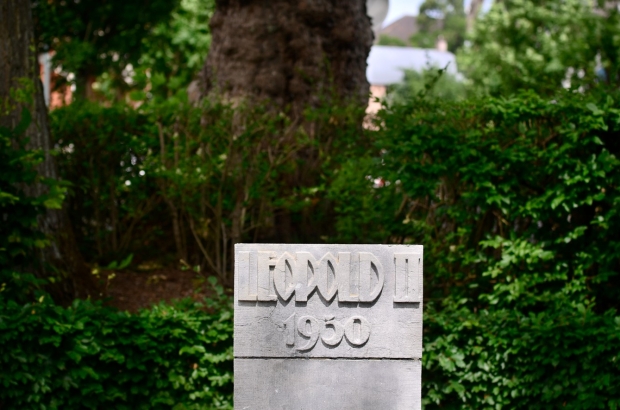- Daily & Weekly newsletters
- Buy & download The Bulletin
- Comment on our articles
Vandalised Leopold II statue could go back on display in Auderghem
An unmounted bust of Leopold II in Auderghem that was removed in June 2020 after being vandalised could end up back on display in a new location.
The bust was originally displayed in the Square du Souverain from 1930, RTBF reports, until hooded activists took a sledgehammer to it as part of the Black Lives Matter movement.
Once the statue was knocked to the ground, it was spray painted with red to indicate the blood spilled in the Congo during Leopold II’s brutal colonial rule.
“The bust of Leopold II has been restored following the acts of vandalism it suffered, and is now stored in a depot belonging to our roads department,” Auderghem mayor Sophie de Vos (DéFI) said.
“We want to put it back when we have something to put the story into context. We think it's no good denying the past.
"We think it's absolutely essential to contextualise in order to understand and raise awareness. It is much better to contextualise a difficult past without concession than to remove traces of that history.”
A motion calling for the installation of historical and educational plaques was adopted by the local council shortly after the vandalism occurred.
The local council turned to the Africa Museum in Tervueren for help, intending to draw on the work of the focus groups set up at both federal and regional level.
It is not only the statue of Leopold II on the Place du Trône in central Brussels that has been causing controversy and finding itself the target of vandalism in recent years.
Several municipalities in the region have already raised the issue of the presence of disputed monuments on their territory and, before his resignation, former Brussels secretary of state Pascal Smet presented a 14-point action plan for the decolonisation of public spaces.
The future of monuments to figures from that time remains unclear in the face of reservations and even anger on the part of associations active in the field of colonial remembrance.
Smet’s action plan, which has not yet been debated in the regional parliament, provides for “developing a participatory process with the communes on the treatment of the various traces of our colonial history, such as the adaptation and/or contextualisation of toponyms and contested monuments, among others, and the development of clear and coherent signage for colonial and post-colonial heritage”.
The aim is to ensure that local authorities are no longer left unprepared.
“What we think in Auderghem is that the contextualisation must be the same throughout Belgium,” de Vos said.
“It doesn't make sense for everyone to set out their own contextualisation. Belgium's historical past is the same everywhere. The regional plan will enable us to move forward quickly. But how? That's still difficult to answer.”
Georgine Dibua, a member of the working group set up by the Brussels region to make recommendations for the drafting of a regional action plan on decolonisation, said there was no separating Leopold II from the atrocious acts carried out in the Congo under his authority.
“Today, Leopold II is contested at all levels throughout Belgium – the history of Leopold II is linked to everything that happened in the Congo,” Dibua said.
“Whether we're talking about one death or millions of deaths as a result of the colonial regime set up by Leopold II, that's one death too many.
"Today, there must be a consensus around the figure of Leopold II. Because in many cases, there is a refusal to accept the role played by Leopold II in the history of the Congo. This poses a problem."
Dibua acknowledges the logic in making contextualisation consistent across all of Belgium but also sees administrative hurdles to that: “If every place where there are monuments to Leopold II has to have a similar contextualisation, this would mean that a directive would be submitted to all the communes where there is a monument to Leopold II or an avenue or square bearing the name of Leopold II. Should we move towards this or not?”
The regional action plan is not clear on this front, Dibua says.
“In any case, work needs to be done with the support of civil society, such as people working in the field of decolonisation,” said Dibua.
“It should be remembered that our working group was set up because there were challenges to this questioning of Leopold II's role in the colonisation of the Congo.”
Photo: Laurie Dieffembacq/Belga
















